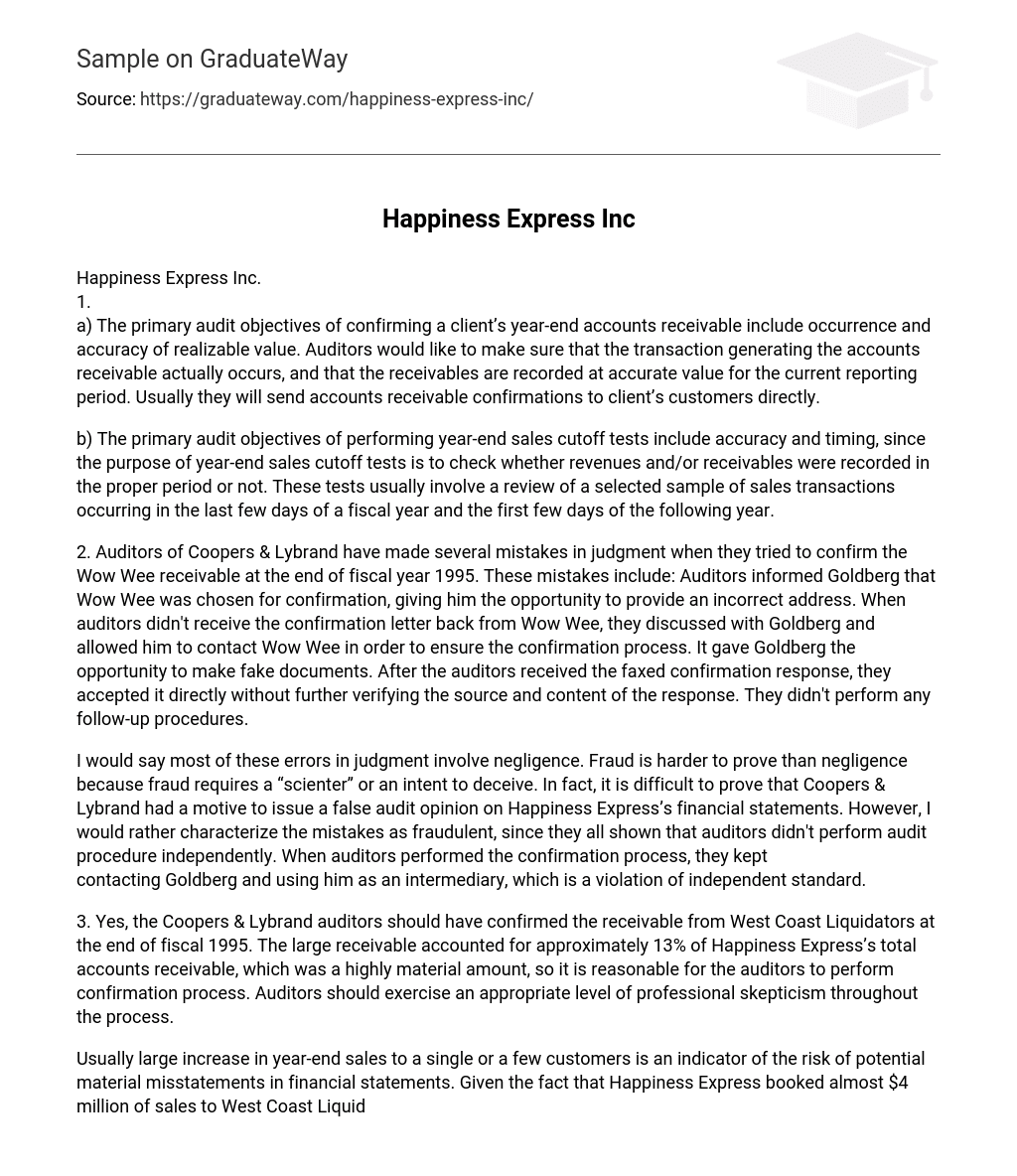The main goals of auditing a client’s year-end accounts receivable involve confirming the occurrence of transactions and the accuracy of the realizable value. Auditors aim to verify that the accounts receivable are generated from actual transactions and that they are recorded at their correct value for the current reporting period. Typically, auditors will directly contact the client’s customers to obtain accounts receivable confirmations.
Year-end sales cutoff tests have two main audit objectives – accuracy and timing. The purpose of these tests is to ensure that revenues and/or receivables were properly recorded in the correct period. Typically, these tests involve reviewing a sample of sales transactions that took place in the final days of one fiscal year and the initial days of the next year.
Auditors from Coopers & Lybrand made several errors in judgment during their attempts to confirm the Wow Wee receivable at the end of fiscal year 1995. These errors included informing Goldberg about the selection of Wow Wee for confirmation, which gave him the chance to provide an incorrect address. When the confirmation letter from Wow Wee was not received, the auditors discussed the issue with Goldberg and allowed him to contact Wow Wee directly in order to verify the confirmation process. Unfortunately, this gave Goldberg the opportunity to create fraudulent documents. Upon receiving a faxed confirmation response, the auditors accepted it without conducting any further checks on its source or contents and did not follow up with any additional procedures.
Most of the errors in judgment can be attributed to negligence, while proving fraud is more challenging as it requires intent to deceive. It is indeed difficult to establish that Coopers & Lybrand had a motive to provide a false audit opinion for Happiness Express’s financial statements. Nevertheless, I would classify these mistakes as fraudulent due to the auditors’ failure to conduct independent audit procedures. During the confirmation process, the auditors continuously relied on Goldberg and utilized him as an intermediary, thereby violating the independent standard.
Accordingly, it was expected that the auditors from Coopers & Lybrand would have verified the receivable from West Coast Liquidators by the close of fiscal 1995. Given that the receivable represented around 13% of Happiness Express’s overall accounts receivable, making it a significantly substantial figure, it is only logical for the auditors to complete the confirmation procedure. It is crucial for the auditors to maintain a suitable level of professional skepticism during the entire process.
Typically, a significant rise in year-end sales to one or a handful of customers signifies a potential risk of material misstatements in financial statements. Happiness Express reported nearly $4 million in sales to West Coast Liquidators at the end of the year, which is highly dubious. Consequently, auditors should have included at least one sale to West Coast Liquidators in their year-end sales cutoff tests for fiscal 1995.
When the auditor does not receive replies to positive confirmation requests, they must use alternative procedures to obtain the necessary evidence and reduce audit risk. In the examination of accounts receivable, alternative procedures may involve reviewing subsequent cash receipts, matching them with the items being paid, examining shipping documents, or other client documentation. These procedures provide evidence for the existence assertion. However, since these documents are prepared and provided by the client, they are not as reliable as evidence obtained through confirmation letters. Confirmation letters are prepared by an external third party and are considered much more reliable. It is recommended that auditors prioritize the use of confirmation letters as primary evidence whenever possible.
Yes, auditors are responsible for considering or investigating the potential involvement of client executives in insider trading activities. Since insider trading is an illegal act that greatly affects the determination of financial statement amounts, auditors must be vigilant. Generally accepted auditing standards typically do not include procedures specifically designed to uncover illegal acts. However, during the process of forming an opinion on the financial statements, the applied procedures may bring any possible illegal acts to the auditor’s attention.
Regarding laws and regulations, some specifically relate to an entity’s operations instead of its financial and accounting aspects. These laws and regulations do not directly affect financial statements. Usually, auditors do not have sufficient information to detect possible violations of such laws and regulations.
Although the main duty of auditors is to uncover and reveal any illegal activities that greatly affect the financial statements, they also need to examine potential indirect effects on those statements. If auditors come across specific information suggesting possible illegal actions, they must carry out targeted audit procedures to establish whether any unlawful activities have occurred. It’s important to remember that following generally accepted auditing standards does not ensure the detection of illegal activities or disclosure of contingent liabilities because these matters are inherently secretive.





